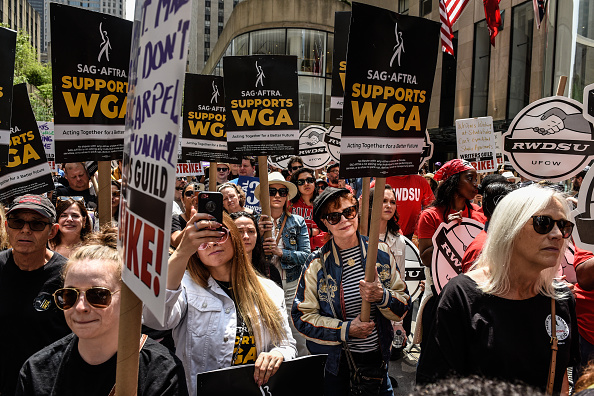Starting tomorrow, entertainment as you know it will be gone.
The Screen Actors Guild and American Federation of Television and Radio Artists (SAG-AFTRA) is about to go on strike. As a recently graduated film major, there are very few instances where my degree actually serves a purpose. So, I am going to take this opportunity to prove to my parents that those four years were not a waste of time and money by explaining to you guys everything that’s going on.
The basics
SAG-AFTRA is a union of all actors and actresses from across the globe. Like any other labor union, SAG-AFTRA is responsible for protecting actors rights, getting them fair pay, and negotiating on their behalf with the Alliance of Motion Picture and Television Producers (AMPTP).
The AMPTP is a collection of all networks, studios, and streamers such as Disney, Netflix, Warner Bros., NBCUniversal, and more. The two groups, SAG-AFTRA and AMPTP, negotiate as two entities to sign contracts that layout agreed-upon standards for things such as compensation, privacy agreements, and all other factors that involve actor’s rights.
What’s happening
The last contract agreement between SAG-AFTRA and AMPTP expired last night, July 12 at 11:59pm PST. Though SAG is no longer under contract, the strike won’t officially begin until today. The SAG-AFTRA negotiating committee, which is led by former star of The Nanny Fran Drescher as the SAG-AFTRA president, decided to fully walk away from negotiations last night and will meet with the rest of SAG-AFTRA to vote on whether or not they strike. A strike is expected as 98% of the guild voted in favor of back in June if talks fell through.
Once the vote this afternoon goes through, SAG-AFTRA will begin picketing tomorrow.
Why are they striking?
Strikes in the entertainment industry occur for various reasons, and in many instances the public is left in the dark. However, SAG-AFTRA has been very open about their reasoning and it seems extremely valid.
Before official talks even began, the guild laid out its requests which included “economic fairness, residuals, regulating the use of artificial intelligence and alleviating the burdens of the industry-wide shift to self-taping.” I know that may just seem like a bunch of mumbo jumbo, so I’ll break it down.
Economic requests
From a compensation standpoint, the guild wants two things. Firstly, due to the way TV has changed recently, shows rarely have seasons with more than 10 or 13 episodes. Due to shorter season orders, the guild argues that actors (who typically get paid per episode) don’t have enough money to support themselves when in between projects. “Outdated contract terms, coupled with the evolution of the media business, including shorter season orders and longer hiatuses between seasons makes it increasingly difficult for our members to achieve and maintain a middle-class lifestyle working as a performer,” the guild stated in their initial demands.
Another problem with the changing dynamics of the television industry is streaming. With streaming taking over syndication, lowered residuals have strongly impacted actors. Residuals are payments actors, writers, directors, and producers get anytime an episode of their show is aired on TV. With streaming the new face of entertainment, residuals have been left in the dark which is one of the main ways actors are able to support themselves when they don’t have work. In their requests, SAG wrote “While new business models mean that more and more SAG-AFTRA content is monetized around the globe, residuals payments are failing to reflect the economic value of this exhibition. SAG-AFTRA is committed to ensuring residual payments both reflect the economic value of our members’ contribution and serve as a meaningful source of performer earnings.”
Other demands
The other main negotiation points surround the new logistics of entertainment. In a world with new technologies arising everyday and the impact of artificial intelligence growing stronger, actors want to protect their own voice, personality, and likeness. Basically, the actors want terms laid out prohibiting studios from using AI to depict them. If AI is used to display an actor, that actor should be properly compensated.
Additionally, since COVID, studios have begun switching over to self-taped auditions. While originally used for social distancing, casting has continued using self-taped reels as they save directors time and money. However, in turn, they just pass off that time and money onto the actors’ burden. As laid out in the SGA requests, “self-taping auditions [are] a massive, daily, uncompensated burden on the lives of performers. Reasonable rules and limitations, and access to other casting formats, are sorely needed to ensure fair access to work opportunities and protect performers against exploitation.”
What does this mean?
So, what does this mean for entertainment going forward? Well, here’s the tricky thing. The Writer’s Guild of America is also on strike right now. Going on day number 74, the WGA hasn’t been working since early May. This will be the first time both WGA and SAG will be on strike simultaneously since 1960. Back then, Ronald Reagan was the president… of the actor’s guild.
Due to the writer’s strike, nothing is being written. That means that only shows like reality television and news are continuing to release new episodes. Everything else that comes out as “new” had been previously written and purchased from studio executives prior to the strike. However, things that were written and sold could still be produced.
With the actor’s strike now too, that isn’t the case. All filming of anything scripted (most things) will be put on hold. Actors across the world won’t be able to work, as laid out in the SAG-AFTRA terms and conditions. That means the only people in entertainment that can work right now are directors and producers. You know what directors and producers can do without actors or writers? Not very much!
They can still film scenes without actors, such as establishing shots, and can also do post-production editing, coloring and SFX. However, they can’t have actors come in for voice overs or re-recording, or use stunt doubles as they are also part of SAG-AFTRA.
Essentially, this means that the only new content we will get in the near future is things that have already been fully shot, news, reality shows, and soap operas (not sure why exactly, but they have their own union for some ridiculous reason). I hope you like Fox News and Days Of Our Lives.
How long will it last?
The short answer is no one has any idea.
The long answer is Fall at least. According to Deadline, a source close to AMPTP president Carol Lombardini had said that studios and networks are planning to drag the strike out to “late October” in order to shake down writers who will be low on funds by that point. The plan is to wait as long as possible until writers are in desperate need of money and willing to come back for less than they had previously been asking. “The endgame is to allow things to drag on until union members start losing their apartments and losing their houses,” an anonymous studio head told Deadline.
I will say that actors are probably a bigger target right now for AMPTP as literally nothing can be made without them. That said, I expect the two strikes to end somewhat around the same time. Bringing writers back with no actors doesn’t really serve a purpose for the studios, so it is possible actors resolve their problems first. In reality, no one has a damn clue.
In fact, that whole October thing could just be a scare tactic to persuade writers to cave now. Really, nobody knows a thing. That includes writers, actors, and every studio head around the world.
We have entered a waiting game. Time to see who cracks first.





